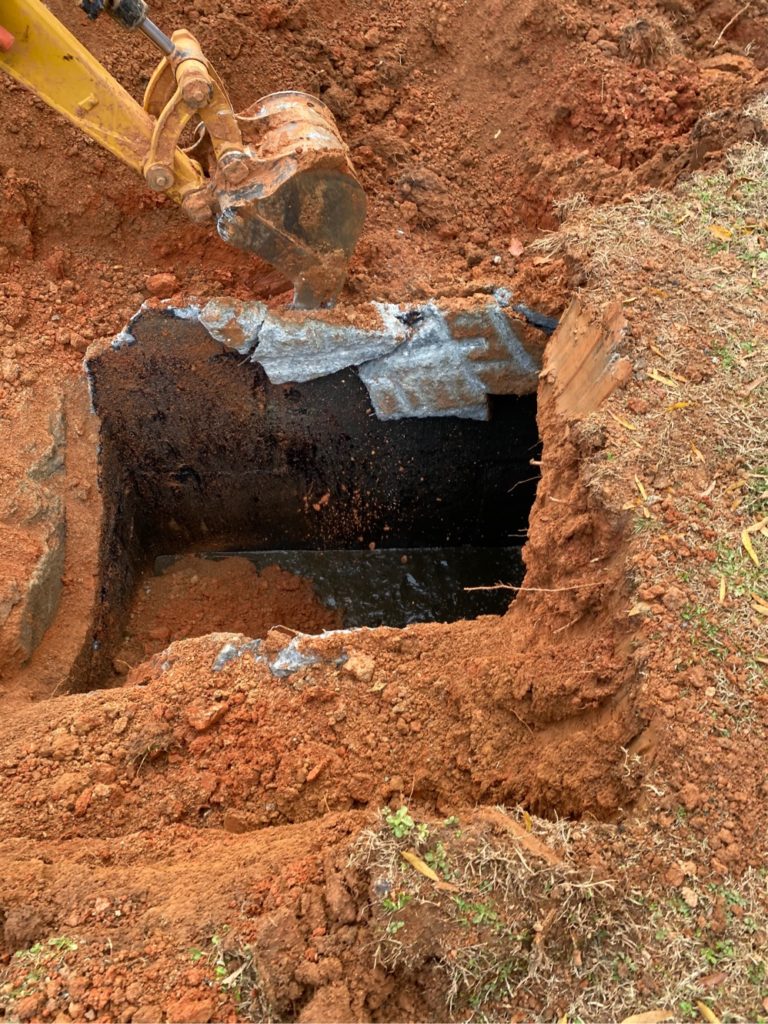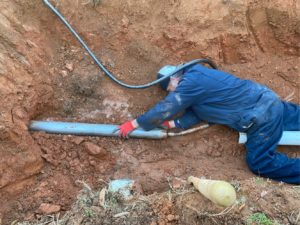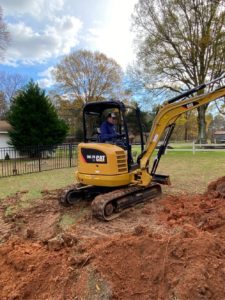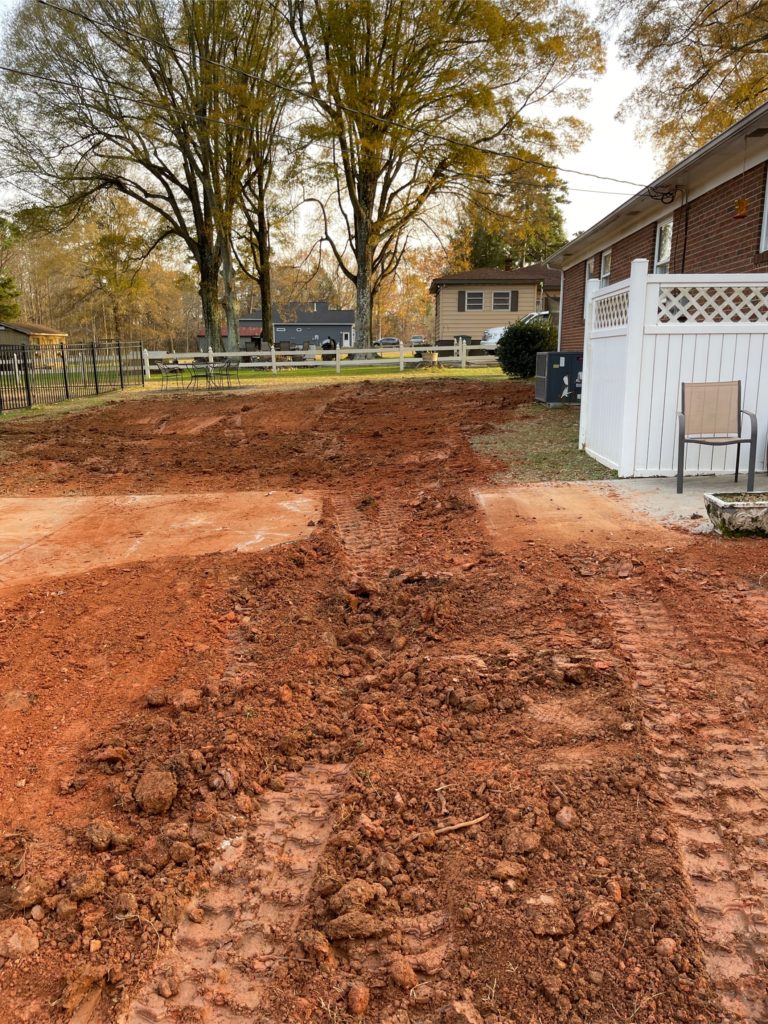You already know all the old jokes and stereotypes about plumbers. Most people think all a plumber can do is twirl a wrench to fix a leaky faucet, busted shower, clogged toilet or maybe a burst pipe. Plumbing can be as simple as replacing a P-trap or swapping out a washer or replacing a damaged section of pipe.
But sometimes, being a plumber means rolling out heavy equipment and performing a major construction project!
 Recently, Ultimate Plumbing received a request to connect a customer’s septic system to the city’s sewage line. The customer had an existing septic tank but wanted to dispose of that and establish a new sewer drain connection with a recently installed city sewer. This is becoming more and more common as the infrastructure of urban areas, such as sewer lines, expand and septic systems age out or become damaged. In some areas, residents don’t have a choice as to whether they keep with their septic system or switch to city sewer service, and with the urban encroachment, it simply made more sense to make the change now instead of waiting for the old system to age out.
Recently, Ultimate Plumbing received a request to connect a customer’s septic system to the city’s sewage line. The customer had an existing septic tank but wanted to dispose of that and establish a new sewer drain connection with a recently installed city sewer. This is becoming more and more common as the infrastructure of urban areas, such as sewer lines, expand and septic systems age out or become damaged. In some areas, residents don’t have a choice as to whether they keep with their septic system or switch to city sewer service, and with the urban encroachment, it simply made more sense to make the change now instead of waiting for the old system to age out.
Ultimate Plumbing showed up on time, offered our customer a few options to consider, and was able to lock in a project cost that the customer approved of. Once that happened, we got to work.
The first step, of course, was calling out the state utility locating service to pinpoint the existing water, sewer, gas, electric, and other utility lines, pipes, and cables. Once they had marked out the area and we knew where to dig, we deployed heavy equipment in the form of a mini-track hoe or “shovel” to excavate the trench. Since the septic system backed right up to the back of the customer’s house, we had to be very careful in digging out the septic tank and drain field. This was important both to prevent damage to the house and soil contamination because septic sewage can leach into the soil and get into the groundwater, carrying with it a rich payload of dangerous bacteria including e. coli and similar nasty critters. You don’t want that in your drinking water!
Once we had dug out the tank and hogged out the trench leading to the sewer connection, we severed the connection from the septic to the house. Then we modified the septic tank to accommodate a connection to the city sewage line. Because of the age and type of tank, we were able to make these changes, which saved the customer a significant amount of money over a complete removal and disposal of the tank, while still complying with all applicable plumbing codes.

At this point, with the sewer connection exposed, we had to lay the pipe which would connect the house to the sewer line. We set and connected the pipe and tested the system to make sure it didn’t have any leaks, gaps, or faults. Now we could turn the water back on and give the customer their first flush. Everything looked great, so we moved to the next step, which included backfilling the trench with the soil we’d removed previously. Then we compacted the overlying soil using a “jumping jack,” which is basically a jackhammer with a flat metal plate on the bottom which directs immense pressure downward at a very high cyclical rate. This was necessary to allow for future construction and to prevent sinking or “subsidence” of the soil in the trench zone. A quick run over the top with the track hoe to make sure everything stayed stable and we were ready to go, leaving another satisfied customer. We’re pleased to report the project was on time and on budget, with no significant hiccups or unexpected issues. Everything went very smoothly and the customer was very pleased with the outcome.
 Converting or transferring septic systems over to city sewers is just one of the unexpected ways a certified plumbing company can help homeowners enhance the value of their home and the performance of their existing plumbing. To learn more about this, check out our FAQ About Septic to Sewer Conversion below. And if you need plumbing repairs, from a leaky showerhead to a burst pipe emergency repair to a complete overhaul of your current sewage disposal setup, click here to contact Ultimate Plumbing!
Converting or transferring septic systems over to city sewers is just one of the unexpected ways a certified plumbing company can help homeowners enhance the value of their home and the performance of their existing plumbing. To learn more about this, check out our FAQ About Septic to Sewer Conversion below. And if you need plumbing repairs, from a leaky showerhead to a burst pipe emergency repair to a complete overhaul of your current sewage disposal setup, click here to contact Ultimate Plumbing!
Frequently Asked Questions About Septic Sewer Conversion
Question: I just got a notice from the city that I have to convert from septic to city sewer service. Can they do that? –Edwin, Mooresville, NC
Answer: Many areas are working to phase out septic systems and drain fields because of concerns about the long-term environmental impact, in favor of contained sewer systems which offer less risk of groundwater contamination and other concerns. This requires that the old septic system either be converted or if the system has failed, removed and a connection to the city sewer line installed. In most cases, you will need to apply for the necessary permits, engage a contractor to perform the work to city standards, and finish paying any fees after the work is complete. Ultimate Plumbing can help with septic to sewer conversion, septic tank removal, and sewer line connection. Click here to contact us for more information!

Question: How much does it cost to connect to a public sewer? –Edith, Denver, NC
Answer: This varies based on factors including:
- Whether there is an existing tap to permit connection to the line or whether one must be installed
- Whether you have a sewer or septic system
- Whether the connection simply needs to be repaired or installed from scratch
- In some cases, where the city sewer line is located can impact the cost to connect
- Whether it’s a residence, commercial property, or industrial connection
- Your locale (i.e. Denver has some different rules and regulations than Charlotte, which is different than Mooresville and so on)
- Whether there is a city sewer in your area at all
In some situations, the city may not have installed sewer service out to your location. In this case, you may need a septic permit to have repair or replacement done on your system. Be sure to check with your local public utilities website to learn more.
Question: Is there a cost to hook up to a public sewer line? –Heinrich, Mooresville, NC
Answer: Yes. As we mentioned above, there are several factors that may change the cost or availability of connecting to a sewer. Generally, most locales require if you’re hooking up to a public sewer for the first time, you have to pay a connection fee. Each jurisdiction has different rules, regulations, and requirements. Ultimate Plumbing is licensed, bonded, and insured with the state of North Carolina to perform sewer line installation and connection in accordance with federal, state, and local laws, statutes, and regulations, as well as applicable building and plumbing codes.
Question: How can I connect my septic system to the city sewer? –Blaine, Charlotte, NC
Answer: Depending on the age and type of system you have, connecting your septic system to city sewer lines could be a very simple task, or simply not worth the time and money. If your septic system is failing or has failed, it’s probably not going to be worth the effort to convert; you’re better off to simply remove it and start fresh with a new sewer connection. However, if the system overall is not too old, in good shape, and functioning well, converting it can actually be an easier and less expensive method than a complete overhaul. For obvious reasons, we do not suggest doing this yourself. Even if you could get the permits you need, one mistake could leave you with a serious problem and questions from folks you probably would rather not have to deal with, such as the EPA. It’s far better, easier and cheaper to bring in professionals like Ultimate Plumbing to connect your sewer line to the mainline and get the job done properly the first time.
Question: Can you still keep your septic tank and use city water? –Laurel, Lake Norman, NC
Answer: Depending on the type, age, and locale, sure. In fact, many people do this. Some people still have well water and septic systems, especially in rural and exurban areas. The problem is, if your septic system fails, there’s no fix for that except starting all over again. With a house to street sewer connection, you dig up one run of pipe, fix or replace it, cover it back up and move on. If the septic goes down, you’ll have to replace the entire system including the drain field. Additionally, as infrastructure advances and becomes cheaper, more robust, and more cost-effective to install, many cities around the country are now doing away with septic systems as an option at all. Local laws vary, but as long as your system’s working okay and you don’t see any indications of failure, you should be all right. Be sure to check your city building or water department website for more information on this.
Question: How can I find out if sewer is available in my area? –Breck, Mooresville, NC
Answer: Your local public utilities commission, City Hall, water department or building department should be able to research that for you. In many places, it’s free to find out if you have sewer service available in your area, and many locales have interactive online maps that show the extent of utilities like gas, water, and sewer lines. Check these agencies in your area for more information.
Some jobs are simply too big to tackle on your own, such as connecting your house to city sewer service.
That’s why we suggest contacting professionals like our staff at Ultimate Plumbing, to get the job done right the first time, every time. To learn more about converting or adapting your septic system to work with city sewer service, please contact Ultimate Plumbing by clicking here. Happy flushing!

